I found the term Africanfuturism (My computer thinks I misspelled Afrofuturism. Thanks, but no, I didn’t.) on author Nnedi Okorafor’s blog, after reading her novella Binti. Like many who pick up Okorafor’s books, I wanted more. I wanted to read more of this Africa that blended science fiction elements to create something new and somehow familiar. But finding more books within the subgenre can be difficult because a lot of bookstores, critics, and publishers treat Africanfuturism and Afrofuturism like the same thing—often grouping the two genres together and calling one by the other’s name, or totally excluding Africanfuturism from the conversation in order to lump all Black stories under Afrofuturism.
The distinction between the two couldn’t be plainer, however. Okorafor describes it in her blog post “Africanfuturism Defined” as a subcategory of science fiction centered in and about Africa and their people.
That doesn’t mean that the stories have to take place explicitly on the continent of Africa, but that the themes, characters, and roots of the story are based in Africa and not in America or another predominantly white Western culture. Afrofuturism on the other hand is also a subcategory of science fiction concerning Black people within the diaspora that often features stories from outside of the continent of Africa and usually in colonized Western societies like America, Canada, and the UK.
For example, Rivers Solomon’s An Unkindness of Ghosts could be considered Afrofuturism while Namwali Serpell’s The Old Drift is Africanfuturism. One follows an antebellum south colony ship and deals with themes closely related to the experiences of Blacks within the African diaspora. The other focuses solely on the stories and futures of African people or places. See the difference?
To help with getting a grasp on what it means to dream of an Africa separate from the Western gaze, to live in a world where Black joy, fear, and love is at the center, here’s a list of books and stories from the Africanfuturism genre to get you started.
Africanfuturism: An Anthology edited by Wole Talabi
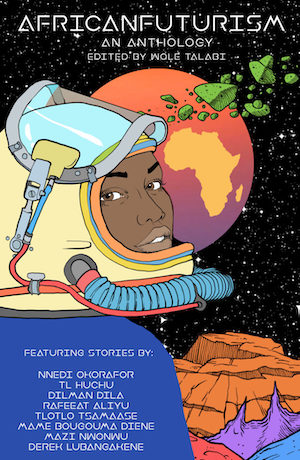
I love using anthologies as introductions to genres because they offer a wide sampling of stories within that style. Editor Wole Talabi’s Africanfuturism: An Anthology does not disappoint in this vein. And like any good anthology, there are stories by prominent and well-known African authors in the genre alongside those of new authors, creating a wide breadth of experiences, themes, and voices. These tales explore what it means to imagine a future Africa and a future for Africans among the stars or on this planet. There are tales like “Yat Madit” by Dilman Dila that explore socio-political themes alongside those of familial entanglements. Following in the same tradition of centering themes of family within a science fiction story is “Lekki Lekki” by Mame Bougouma Diene that is equal parts beautiful and emotional.
The Old Drift by Namwali Serpell
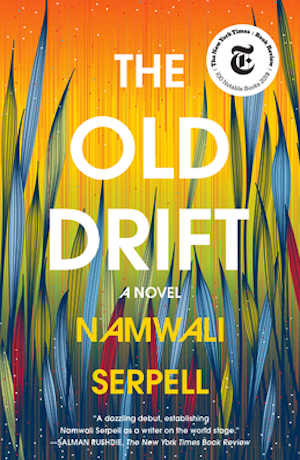
Zambian author Namwali Serpell’s The Old Drift has recently made the rounds of being hailed as a staggering feat of debut greatness from. It’s sorta a historical novel, sorta fantasy, sorta science fiction, all around breath-taking journey into the past, present, and future. There’s a lot going on in this book, but the key takeaways are centered in African histories, dreams, and fears. Winner of the 2020 Arthur C. Clarke Award, The Old Drift explores the interwoven lives of three families and their interconnectedness to the history and future of a slightly embellished Zambia. This is one of those books that has sometimes been labeled as an afrofuturist text, but the content, characters, and themes stick close to Africa and aim to show its pain, power, and promise.
Lagoon by Nnedi Okorafor
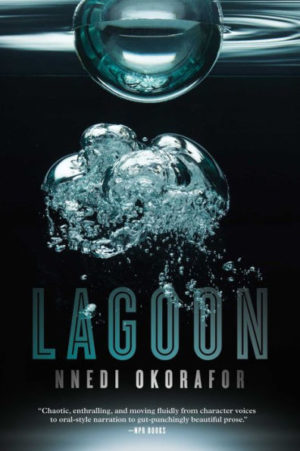
I would be totally beside myself if I didn’t include Okorafor on this list. The challenge came down to which book to include. No doubt, you should read all of her books and see for yourself the diverse themes and contents that make up africanfuturism. There’s the instant go-to Binti, which showcases in a dazzling way the merging of African ideals and customs with science fiction tropes and themes. Or her contributions to the Black Panther series, Shuri and Long Live the King. But those were too on the nose for me, which is why I choose Lagoon, a story that plays with the first contact trope in a way that makes it feel more magical and less scientific without sacrificing the science of it all. In Lagoon, Okorafor offers a new take on an overplayed and usually violent story by using familiar elements in new ways. Yes, there is horror to be had in an alien setting up shop in your hometown, but there is also growth and change that comes with it.
The Prey of Gods by Nicky Drayden
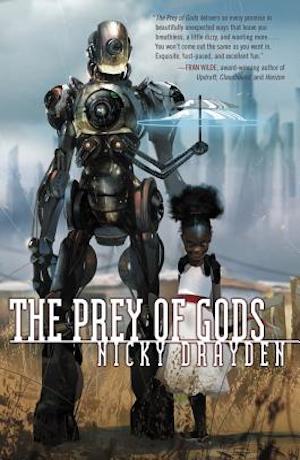
Like The Old Drift, Drayden’s The Prey of Gods straddles the border between multiple genres, blending them all into one multifaceted tale centered around a future South Africa. Drayden presents a promising world where there are many advancements that make the world and people of South Africa better in some regard. However, Drayden doesn’t stop there. Pushing past the good that scientific advancements bring, there are gods and tech out of sync with this new, better world, threatening to turn it to ruin. A story with queer and Black heroes working together to save a piece of Africa, The Prey of Gods is a great take on what the hope of the future can bring in more ways than one.
Ife-Iyoku, Tale of Imadeyunuagbon by Oghenechovwen Donald Ekpeki
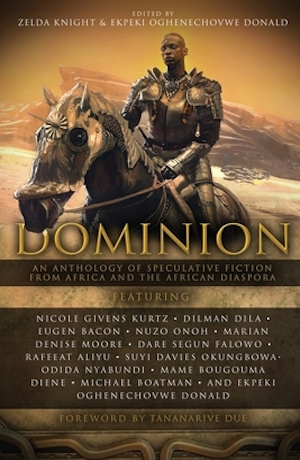
There’s this theory that people from severely colonized nations have already lived through an apocalypse, that their lives thereafter are all post-apocalyptic. Having this theory in mind while reading Ekpeki’s novella Ife-Iyoku, Tale of Imadeyunuagbon makes this story feel less futuristic and more current, more real. The imagined war that nearly lay waste to the continent of Africa giving rise to powers and nuclear waste creatures sounds like a loose metaphor for the truth. Featured in the Dominion anthology of tales from Africa and the diaspora, Ife-Iyoku is a story that rejects many tropes of the science fiction genre in order to strike a new tale of choice and freedom set in a post-apocalyptic Africa.
War Girls by Tochi Onyebuchi
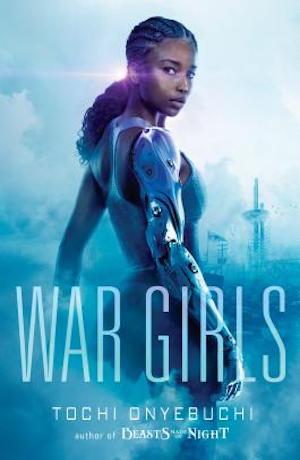
Onyebuchi’s War Girls is an africanfuturist tale surrounding two sisters in a future Nigeria. Like past Onyebuchi books, the author does a marvelous job at writing for young audiences in a way that doesn’t hide or downplay the violence and horror of what it means to be a child in a war-torn country. The story follows the two sisters as they wage war for and against their home, for and against each other. This is a Nigeria marked by its past and striking out at a new problematic future in the process of being changed by its children.
***
For some, there may not seem to be a need for distinction between the two subgenres. Black stories are Black stories, right?
Hell no.
When we as Black authors grapple with our own Blackness and roots whether in the diaspora or in dialogue with Africa, we are taking control of our own futures, stories, and histories. By doing this, new technologies and ways of being emerge, giving insight to the readers about how to interact within their own communities. Tropes that felt old and tired to begin with are birthed anew and cloaked in Black hope and intrigue. This is magic.
Aigner Loren Wilson is a SFWA, HWA, and Codex writer who hails from the Lenapehoking coast. She writes poetry, nonfiction, in-game stories, and fiction. Aigner is an associate editor and copy editor for the award-winning magazine Strange Horizons and horror podcast Nightlight; a writer for Oly Arts, Discover Pods, and other publications; and a judge for the international writing contest NYC Midnight. She is an Otherwise Fellowship honorable mention for 2019, and her work appears in Arsenika, Terraform, Rue Morgue, and more. Her work has been called evocative, noteworthy, and imaginative. Currently, she is writing and editing for herself and others while working on the endless submission grind for her short and long works.










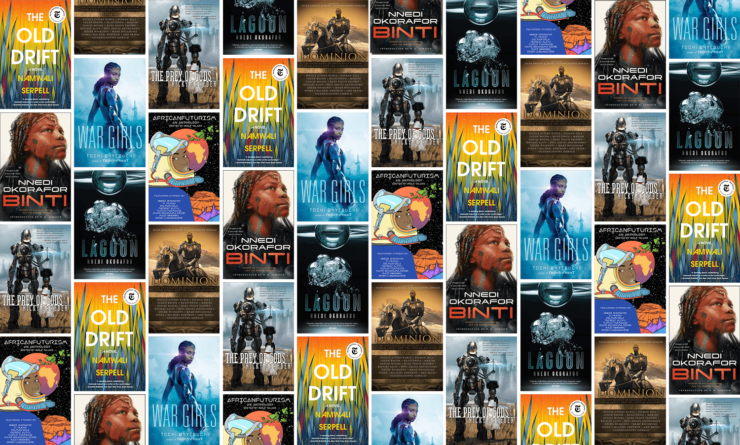
Some new entries to add to my “to read” pile.
I love reading science fiction from cultural milieux other than the “Anglo-centric” standard. In the past the only alternatives I found were Russian or of course Polish (my beloved Stanislaw Lem). It’s great that it’s becoming easier to find voices from other cultures.
One comment about terminology, I do find the differentiation between Afrofuturism and Africanfuturism useful but I wonder if perhaps the problem is that the two terms sound too similar. Maybe someone should think of a more distinct word for either of them (not me!)
Very interesting:theme :)

I worship at the altar of Dr. Okorafor. These all sound awesome and I cannot wait to delve in.
There is one thing I don’t get. Why is classic fantasy in a medieval European criticized because all the characters are white (and therefore we have adaptations like The Witcher where old Europe consists of multicultural societies), or science fiction written by “straight white males” considered for being old and passé, while Africanfuturism and similar concepts are celebrated for doing the same?
@5: I’m going to assume this question is genuinely being asked in good faith, with a willingness to listen and learn from the responses. I hope other people chime in and offer constructive responses–there’s a lot to be said on this topic, and I’m sure that there are many people who can offer their insights and perspectives if they choose to engage. To start though, I will just say that setting up a strawman argument in which Africanfuturism is somehow being celebrated at the expense of tearing down older modes of SFF isn’t a useful place to start.
Culture/fiction centering on cis, white, straight, Western, and largely male experience has long been the default, while other identities and experience were suppressed, silenced, and subject to erasure. In embracing and celebrating what the genre of Africanfuturism has to offer readers, absolutely no one is suggesting other voices should be suppressed or canceled out. Science fiction and fantasy can always encompass *more*–more voices, more traditions, more ideas and perspectives, all taking their rightful place in our imaginations, and hopefully causing us to question what’s lost when we cling to the “default” approach of storytelling. Of course that should be celebrated.
It’s great to get more exposure from writer all over the globe!
I’m not terribly surprised, though, about the issues you describe with the term Africanfuturism. To me, that term sounds very forced. It’s ungrammatical but writing it apart (African futurism) would probably not be what their proponents would want. It’s also essentially identical in meaning for the uninitiated with Afrofuturism as “afro-” simply meaning belonging / pertaining to Africa (in a semantic sense) so the distinction between Afrofuturism and Africanfuturism isn’t really apparent.
I also think that you cannot take it as a given that “bookstores, critics, and publishers” adopt a term that a writer has invented. John Clute also consistently uses “fantastika” for “speculative fiction”. I guess, he’d like to see this term to be widely adopted, yet it is not from what I see.
Now, I’m not saying that a new term will never stick – it very well might. But you cannot make an industry run with your new term, especially if it is so prone to being confused with another existing term. “I like this word. Now everybody must use it!” – that’s not how the world works. At least, that’s my opinion.
Another issue I see, but maybe that’s because of my outside view as a European, is that the term Afrofuturism in the way you use it doesn’t seem to have much to do with Africa. If I understand correctly, you apply this to SF concerning black people (and it seems primarily those from the US) because they have ancestry in Africa centuries ago.
I guess that this is a delicate topic for Americans because it touches on what I see as one of the most deeply rooted societal problems in the US (“race” relations*) but I’d say that there’s very little Africa in modern “African-Americans”. I wouldn’t call myself an expert on African matters but I’ve worked in different parts of Africa and the cultures I’ve encountered are very different from the modern US, and that includes the black community.
I’d say that if “blackness” is a defining feature of what you call Afrofuturism then Black SF would be a better term but maybe that’s to loaded a term to fly in the US.
But then, what Okorafor labels with this clumsy term Africanfuturism could then be called Afrofuturism which would be much more logical to me.
Anyway, that’s just my thoughts. :-)
* I put the word race in scare quotes because the concept of race is so unscientific and should be dropped entirely; also, the way it is used in the US, which is an echo of the one-drop rule seems not appropriate for a modern society at all to me.
I think I get the distinction between Afrofuturism and Africanfuturism.
In my head, I think Afrofuturism is very US centric. It’s springing from a forced diaspora (which is different from Asian and Chinese diaspora), and it relates very much to a people whose culture and history were forcibly, as a policy, erased and destroyed, leaving only vague memories that were transmogrified into something greater when infused into US culture.
This is very much not the case in Africanfuturism, where the history and culture stayed in place and were developed upon.
The two aren’t the same, and to conflate the two is very much a part of the “race” problem that some people think is just a US problem (which it really isn’t; you can see the same cultural factors in English and European societies.
Does The Ear, the Eye, and the Arm count as Africanfuturism?
@7: Actually, if you look at the history of anything, but in this case speculative fiction, that is exactly what happens.
Someone, be it an author, editor, or Lisa in marketing, coins a term to better define or sell a certain type of story. That term is put out into the world and yes, other people end up being expected to use it. Science fiction purportedly first appeared in advertisements in a magazine in 1929, author K.W. Jeter came up with the term steampunk in the late 80s, space opera was coined by author Arthur Wilson in 1941. An author wanting their work referred to in the correct context is not them being unreasonable. There was no term for the type of stories Orkorafor was writing, so she gave it a name. Your fantastika comparison fails straight out of the gate because there’s already a widely used term in place, he’s just trying to replace it.
Afrofuturism, coined in 1993 by author Mark Dery, specifically encompasses futuristic ideas and the African diaspora, definition: consists of the worldwide collection of communities descended from native Africans or people from Africa, predominantly in the Americas. Africanfuturism on the other hand is concerned with Africa and native Africans. The “issue” you’re claiming to have with afrofuturism not being Africa-focused is, in fact, just what the genre is. Thus why Africanfuturism is a different subgenre.
Are the two subgenres similar? Sure. Are they the same? No. Should people strive to use the correct terminology once they have been corrected? Yes, if their goal is to effectively communicate with other people about subjects relating to africanfuturism or afrofuturism or if they just like using the correct words for things.
Otherwise, they’ll just be this guy.
Yes, SquiggyD, I’d say Nancy Farmer’s The Eye, The Ear and the Arm is indubitably AfricanFuturism, given it takes place in a futuristic Zimbabwe. As for Wilson’s query, the problem with all white European ‘classical fantasies’ is that they rest on false history – research is increasingly finding the black African presence in ancient Roman, let alone Medieval societies. But these facts have – till recently – been whitewashed out of history and consciousness. The problem with stories replicating this, is that it perpetuates the historical erasure of black people. ‘Black-centred fiction,’ such as in AfricanFuturism, can easily include white people too, given white (colonial) settler presence in Africa, that is extendable into futuristic representations. This is about celebrating *all* of our stories, from across the globe. This world is more than big enough for everyone’s voice.
Check out the Poseidon’s Children trilogy by Alastair Reynolds. Its a great series with Africa as the leading nation in the future exploration of space.
@11: I wasn’t aware that the term Afrofuturism has been around for so long. Not well chosen, IMHO, for the reason I’ve talked about before, but if it’s been in use for well over 20 that ship has probably sailed.
I still think that Africanfuturism as one word is an awkward term but what do I know? I guess, time will tell whether the term will stick or not.
In the end, as a reader what’s important for me is less the name a genre is given but rather the stories itself.
@5: I for my part don’t understand why fantasy like Witcher, that includes people who aren’t white, get so much criticism – it’s fantasy for the sake of Crom; why should it cleave to some vision of historical Europe that is still inexplicably free of Roma, Jews and gays, for example? Some people seem to think dragons and magic and hobgoblins are more believable than people of other colours than pale beige.
Also, how many books get criticized for having white people in a European setting? I don’t really see that happen so often. Not in the way of ‘this particular book is too white’ – of course it happens but not that commonly. It is more that the number of book with all-white, all-straight, all-ablebodied etc cast have been the norm for so long, and that has slowly been changing. At least a bit. Some may write think pieces on Lord of the Rings being rather white and male, but hey, someone is always writing think pieces on LotR, it is a cottage industry; and the criticism is my opinion valid. It paints a picture of a wide world where there are other races, but those just happen to be are all evil: JRRT could have done better, in that regard. It’s still a behemoth of the fantasy landscape, for good reasons, but maybe we could have just copied Howard instead? Conan has of course a lot of stuff that would not swing today, but we could have started from his multi-ethnic settings and improved on them, rather than reheat Tolkien’s world over and over again – and perhaps we would not need to have this discussion now. Well, we did not, and this particular view of very Anglo-Saxon fantasy world has dominated the genre for a long, long time. Can we not move on, at least for the sake of variety? When is innovation not a good thing in art? Besides which more than one kind of book is being written and sold – they compete for readership, but now with self publishing especially, whatever your niche, it is probably being catered for.
There is this idea of equivalency, that does not quite add up: If world had been created last week, then we could say that a book of all Asian cast, say, is just the same as all African and so on. But we do not live in that world, there exists a thing we call ‘history’. Which has traditionally been written by white straight (maybe a few closeted gay) men. As has literature, putting usually the white man in center of the narrative, sometimes the white female, usually from the top of society, and this has been the status quo for centuries; then along came science fiction and fantasy, and mostly followed the old tropes. Against this background, writing an African-centric book is not just a mirror image of a book with a European setting. Another aspect is purely commercial: USA dominates the entertainment business, and to lesser extent Europe, and both mostly cast white people and tell the stories of white people. Not that by any means all are, but it is even now still disproportionately white and male. This is also why pointing at some TV series like Kingdom and saying ‘Look at that, it has all Korean cast!’ is not the same thing: Korean TV series are not raking in the money or shown prime time in every corner of the world, like US TV series are.